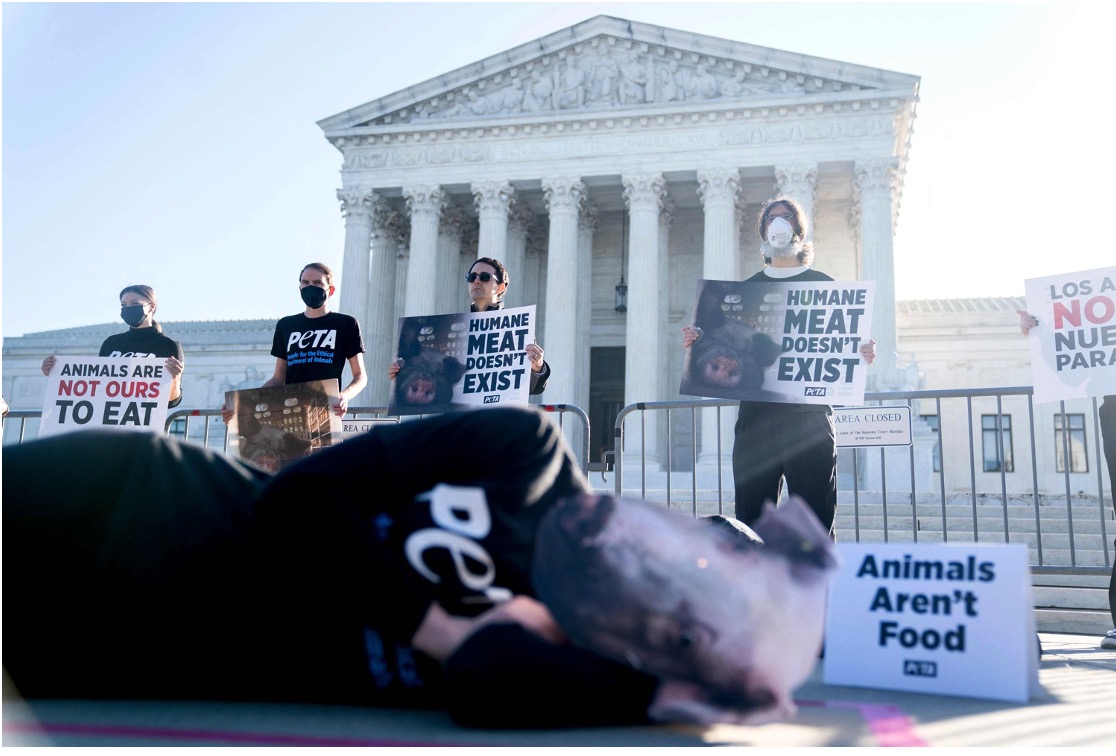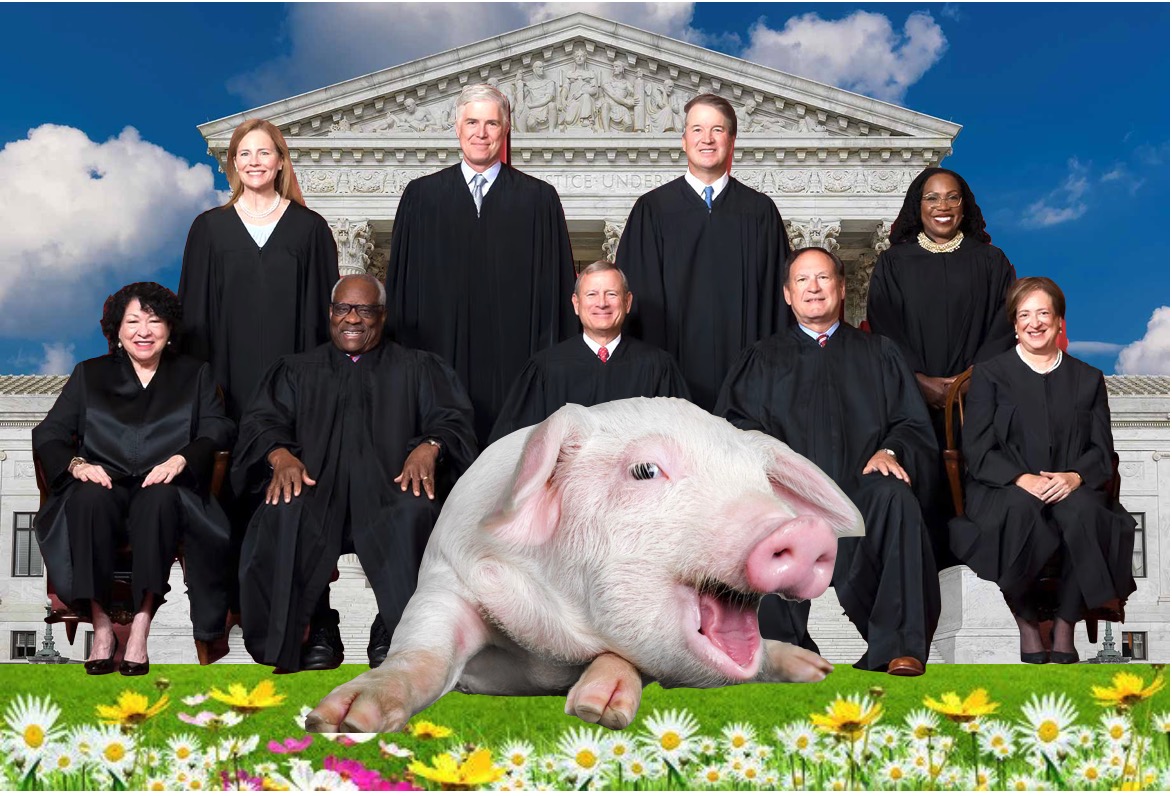Comments
ACCORDING TO LIZ - Last Thursday, on May 11th, the U.S. Supreme Court upheld the law that prohibited the sale of pork, eggs, and veal in California derived from creatures confined in a cruel manner.
A win for animal rights, but also for the people and the state.
In 2018 a strong majority of California voters passed Proposition 12. It prohibited the confinement of animals in cages below a specific number of square feet and, more importantly to producers in other states, banned the sale of veal, pork, and eggs when animals are confined in areas smaller than the minimum square-foot requirements.
The legislation was supposed to come into effect in 2022 but, when corporate agricultural interests realized they would have to comply to continue to reach the lucrative California market, they used every means possible in efforts to block its implementation including invoking the Commerce Clause.
After losing a series of court cases and appeals, the plaintiffs filed a brief with the Supreme Court challenging the law’s constitutionality.
The National Pork Producers Council and the American Farm Bureau Federation argued that California’s legislation would force those they represented to pay more in production costs to access Golden State consumers thus dictating how companies in other states operated.
While the Commerce Clause does give Congress the power to regulate commerce between states, invoking it to protect profitable activities that put the interests of a few before the needs of the many just got a jolt from what many perceived as a resolutely corporatist Supreme Court.
In the majority opinion, consisting of Justices Neil Gorsuch, Clarence Thomas, Sonia Sotomayor, Elena Kagan, and Amy Coney Barrett, Gorsuch wrote that “companies that choose to sell products in various States must normally comply with the laws of those various States."
The other four justices recommended the case be returned to the lower courts where it had already suffered multiple failures in its quest to overturn the Californian legislation.
The opinion went on: “while the Constitution addresses many weighty issues, the type of pork chops California merchants may sell is not on that list."

The plaintiffs were not family-friendly farmers, those of our schoolbooks who are, as the American Farm Bureau Federation’s President puts it, “dedicated to caring for their animals.”
Big Ag’s bottom line is king and “how can we do it for less” is the driving force to increase return on investment. By any means necessary.
They are the Wall Street-backed factory farming corporations, notorious for their ecological despoliation, air and water pollution, labor infractions and tax manipulation in addition to well-documented animal abuse.
Two out of three breeding sows are owned by the 40-odd corporate producers in a handful of states, producers responsible for much of the rampant environmental, labor and animal abuses prevalent within the industry.
Just four meatpackers – JBS, Tyson, Smithfield, and Hormel – control 70 percent of the market; close to 75% of pigs raised in the United States are owned by these companies, not family farmers.
Contracts with small farming operations direct exactly how pigs are to be raised from birth to pre-slaughter to maximize corporate profit. Those who do not obey these dictates do not get paid. If they don’t get paid they lose their land.
One brief filed with the Supreme Court on this case by 378 veterinarians and animal welfare scientists had argued that pork producers should not enjoy a constitutional right to raise pigs in conditions that “cause profound, avoidable suffering and deprive pigs of a minimally acceptable level of welfare” and then sell those products to consumers.
And, indeed, the American consumer may have the final say as some of the major pork producers were already moving to comply even before this ruling. Consumers have become increasingly disillusioned by the rampant cruelty evident in factory-farm animal husbandry, and more and more are demanding ethical practices in the supply chain that places ham and eggs on their plates.
However, claiming a single state should not be allowed to disrupt a lucrative American industry, and pressured by legislators such as Chuck Grassley who depend on Big Ag’s support using scare tactics and threatening large price increases, the Biden administration took the side of pork industrialists.
They lost.
Food and Water Watch issued a statement: “Today’s high court ruling is a rightful victory for sustainable, humane farming against giant corporations that prioritize cost-cutting and profit margins over the environment, food safety and animal welfare.
The Center for Food Safety declared the decision "a major victory for animal welfare and a more regenerative, healthful, and humane future of our food."
The outcome of the push towards healthier animal husbandry and healthier animals will result in healthier foods containing fewer artificial growth hormones and antibiotics, more responsible farming practices, less chance of pathogens spreading, along with better waste handling and improved water usage.
More importantly, as also set out in the Food and Water Watch statement: “It is also a critical victory for the rights of states that seek to do better on those issues than some of their neighbors, or the country at large.”
California must continue to be a leader for progressive change, even when forces arrayed against them, ranging from disproportionate Senate representation to the anachronism of the Electoral College to ever-increasing buying of elections by corporate interests, try to stack the deck against our individual well-being.
(Liz Amsden is a contributor to CityWatch and an activist from Northeast Los Angeles with opinions on much of what goes on in our lives. She has written extensively on the City's budget and services as well as her many other interests and passions. In her real life she works on budgets for film and television where fiction can rarely be as strange as the truth of living in today's world.)





